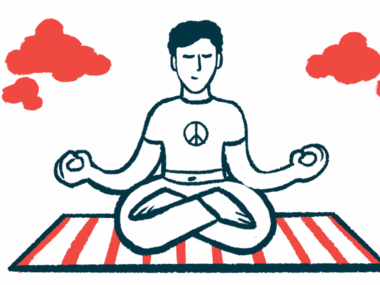CF fatigue isn’t laziness: How to build support when CF fatigue exhausts you
Written by |
This is part of a series about living with invisible illness for Cystic Fibrosis Awareness Month. Go here to read more.
Life with an invisible illness feels like the buildup of a million social wounds. When people can’t see a disease’s effects on your body, assumptions are made, and the assumptions often aren’t flattering.
We live in a competitive, fast-paced society, and it’s difficult to keep up if you’re not energized. It’s social survival of the fittest. Growing up with cystic fibrosis (CF) and its associated fatigue, I often needed to rest when others were working or having fun.
Some people assumed that I was a killjoy, a flake, or lazy. It happened enough that I began assuming everyone thought that of me, even if they were outwardly gracious toward me. And even worse, I began believing it about myself.
It wasn’t until I got a bilateral lung transplant and felt a rush of energy unlike any I’d experienced since childhood that I realized how much CF had demanded of my vitality. And to think that I still have less energy than many completely healthy people! My fatigue was and is not mere tiredness — it’s immensely heavier — and it’s certainly not laziness.
I now realize that I had to work harder than others simply to breathe, yet I only compared our external, visible activities — as in, I’d fallen for the trap of invisible illness because I only looked at what was visible.
Have mercy on yourself, and boost awareness of fatigue to get mercy from others. Here’s how you do it.
Identify fatigue’s undercurrents
What drives your fatigue? The first step to understanding your fatigue’s needs and getting understanding from others is to clarify what drives it. When you or others read this list, a light bulb might go off: How could a person not be exhausted with all of this?
Fewer nutrients: If you’re pancreatic insufficient, you need more calories and nutrients to make up for your inability to absorb the nutrients that are necessary to function and to get good sleep. Malnourishment tires anyone out. But atop that malnourishment, many also have CF-related diabetes, which also saps energy.
Respiratory effort and coughing: Labored breathing is exactly what it sounds like: laborious, difficult, and tiresome. Add in high-impact coughing, and you’re burning lots of calories.
Cardiovascular strain: Many people with CF have heart conditions like pulmonary hypertension, pulmonary arterial enlargement, and high blood pressure, and many heart conditions can either directly or indirectly cause fatigue.
Chronic inflammation: Infections drive inflammation in CF lungs, along with many high-calorie diet choices, and that inflammation kicks the body’s immune system into overdrive, demanding more energy.
Treatment side effects: Many medications, such as commonly prescribed prednisone, can cause insomnia or drowsiness.
Sleep instability: Many with CF experience sleep disturbances caused by coughing, medications, and pain.
Pain: CF can indirectly cause pain from infections, postural issues, muscle strain from coughing, and gastrointestinal issues. Pain comes with many indirect effects on energy and the ability to rest.
Emotional toll: The anxiety and depression that are common in people with CF drains one’s battery, and brain fog makes thinking much more exhausting. So a person with CF might be generally working harder than others to keep up.
See why you deserve mercy?
Building up support
We can’t expect others to assume what’s going on in our bodies, but we can counter assumptions with awareness. A more aware world is a more harmonious world.
When others make you feel unseen in your efforts to keep up, or shame you for resting, you might simply send them this article.
If you prefer to have a conversation with the person, here are some pointers:
Leverage comparison: A person with CF might be compared to healthy folk negatively, but comparison can also be an advantage. Help others remember a time they were very sick with something like the flu, and explain how that’s a fairer comparison to how you feel. You might find other illustrations more useful; some ask others to breathe through a straw and compare that to how it feels to breathe through restrictive airways.
Be merciful: If you’ve been misjudged, don’t respond with misjudgment. Many people really have no idea what CF does to energy. And they might even be criticizing you from a place of hurt. For example, they might think you canceled plans because you don’t care about them. Have open, gracious dialogue with that person so you can strengthen your relationships with truth and perspective rather than accusation and assumption.
Be specific about needs: Don’t leave things at education. Instruct people with specificity about what would and wouldn’t be most helpful to you when you’re fatigued, so they aren’t left feeling like they need to walk on eggshells around you. Frame things around your desire to participate in life with them: “I want to do this, but in order to have the energy to do it, I need …”
Life with invisible illness isn’t easy. But it’s also not easy to understand and help a person with an invisible illness. Educating others isn’t only about strengthening you, it’s about strengthening your relationship with that person.
Note: Cystic Fibrosis News Today is strictly a news and information website about the disease. It does not provide medical advice, diagnosis, or treatment. This content is not intended to be a substitute for professional medical advice, diagnosis, or treatment. Always seek the advice of your physician or other qualified health provider with any questions you may have regarding a medical condition. Never disregard professional medical advice or delay in seeking it because of something you have read on this website. The opinions expressed in this column are not those of Cystic Fibrosis News Today or its parent company, Bionews, and are intended to spark discussion about issues pertaining to cystic fibrosis.






